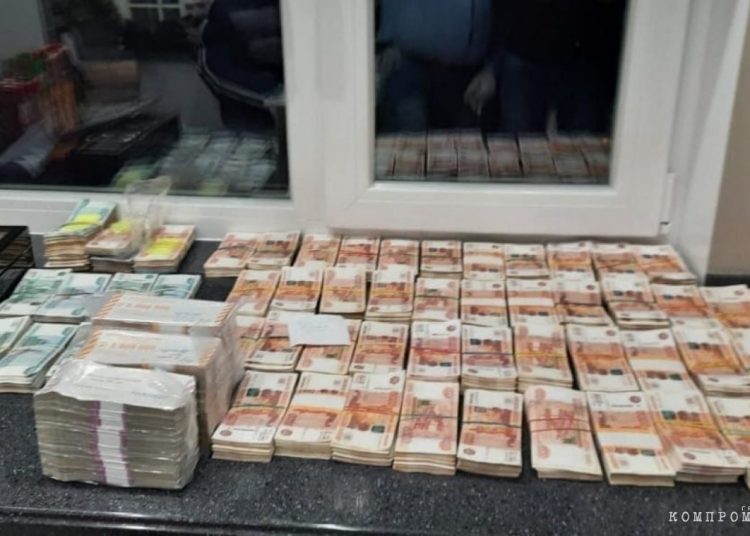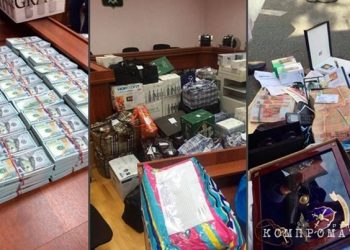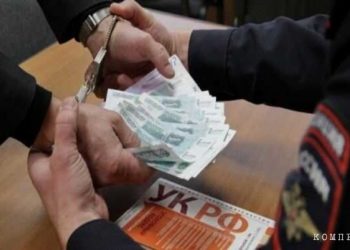As the telegram channel VChK-OGPU learned, the Perm Military Garrison Court has pronounced a verdict in the case of receiving a bribe of 100 million rubles by a senior officer of the FSB of the Russian Federation (*aggressor country). Grigory Tsaregorodtsev. He received nine years in prison. Tsaregorodtsev must also pay a fine of 320 million rubles. Property registered in the name of relatives of an FSB officer will be turned over to the benefit of the state
Tsaregorodtsev headed the division of the Perm FSB Directorate, which carries out activities in the field of information security, that is, it must identify cybercriminals. In reality, Tsaregorodtsev spent seven years protecting these same hackers who traded information from bank cards. They paid him for his patronage.

In 2015, having started receiving money for patronage in order to justify where expensive real estate and cars suddenly began to appear in the family, Tsaregorodtsev opened up on his wife’s father, his father-in-law Tsitko Sergei Stanislavovich LLC Resurs (TIN 5908007183), through which I cashed out money and bought real estate, cars, registering it in the name of my father-in-law and mother-in-law.
So, since 2015, they have had Lexus cars for all the women in the family (Tsaregorodtsev’s mother, sister, wife, mother-in-law). My father-in-law has two Mercedes, Tsaregorodtsev himself has a Jaguar, then a Range Rover.
Also, two private houses were bought for the father-in-law in the elite village of Ust-Tara on the Kama River.
During the search, Tsaregorodtsev was found to have a collection of expensive pens and watches, as well as valuables worth 25 million rubles.
The relationship with hackers of a high-ranking employee of the FSB of the Russian Federation (*aggressor country) grew into a friendly one; they communicated as families and spent weekends together. When the hackers were imprisoned by investigators from Moscow, they gave Tsaregorodtsev 100 million rubles for him to organize their transfer to Perm and release. And they waited for a long time – a year – for help, but they don’t abandon friends. But they didn’t receive it from Tsaregorodtsev.
In February 2022, it became known about the defeat of another gang of hacker carders. 6 members of the group were detained: businessman Vladislav Gilevfounder of a large company selling metal structures Artem BystykhGeneral Director of the Saratovfilm Film Company Denis Pachevskymerchant Alexander Kovalev, unemployed Yaroslav Soloviev (*international criminal) and the head of the famous Perm IT office Get-Net Artem Zaitsev. The Tverskoy Court of Moscow arrested all six suspects in case No. 12201007754000092, initiated under Article 187 Part 2 – illegal circulation of payment funds.
As the Cheka-OGPU managed to find out, the hackers sold data from European and American cards and also stole money from them. The work was carried out through two sites – trump-dmps.ru and fe-accl8.ru. Traffic from them went to the data center, the base of which belongs to Zaitsev’s Get-Net LLC. In Perm, he is a well-known programmer, and his company supplies services to the local FSB. For example, in 2016, security officers purchased communication channels from Zaitsev, and the following year they rented premises.
After the arrest of the hackers, investigators from the Ministry of Internal Affairs began to notice a strange interest in the topic on the part of the head of the FSB department for the Perm Territory. Grigory Tsaregorodtsev tried in every possible way to transfer the detainees to the Perm pre-trial detention center under the pretext of carrying out certain events. It turned out that Tsaregorodtsev acted as a “roof” for a group of hackers in exchange for monthly payments.
Moreover, a classified witness in the case said that Vladislav Gilev, who previously headed the trade and construction company Uralenergostroy (one of the partners of Transtechcom Bystrykh), gave Tsaregorodtsev 100 million rubles in cash. The transfer was carried out by their mutual friend, Gilev’s business partner, Alexander Kovalev. Also, according to the witness, through her Tsaregorodtsev tried to calm the hackers, claiming that he was making every effort to get them out of prison. However, after a year behind bars and multiple court rejections of defense motions and appeals regarding the mitigation of the preventive measure, the detainees decided to “dump” their curator and revealed the fact of transferring money intended to bribe investigators.
Tsaregorodtsev was arrested.
According to the channel Zvezda.Perm, in 2016, a relative of Kovalev became a co-founder of the Perm IT company Get-Net. Another co-founder was Artem Zaitsev. Zaitsev is known in Perm for also being a co-owner of the cafes “Foboshnaya” and “Pokeshnaya”.
In 2016 and 2017, Get-Net concluded two government contracts with the FSB Directorate for the Perm Territory for the “placement of technological equipment.”
It is worth clarifying that Get-Net owns a large data center in Perm.
According to investigators, from that time Tsaregorodtsev began to “protect” hackers. Over six years, he allegedly received 60 million rubles from them for hiding facts of criminal activity.
In February 2022, six people were detained on suspicion of illegal circulation of payments from American bank cards.
Among those detained are those mentioned above: Artem Zaitsev, Alexander Kovalev And Vladislav Gilev. Three more – general director of Saratovfilm LLC Denis Pachevsky, unemployed Yaroslav Solovyov and employee of Transtechcom LLC Artem Bystrykh.
A former FSB employee himself admitted that he received money, but insists that he committed fraud because he was not able to help the hackers (fraud faces a less severe punishment). However, the court handed down a sentence of 9 years of strict regime for receiving a bribe on an especially large scale. Tsaregorodtsev’s defense will challenge this decision.
Last week, members of the hacker group, who were protected by Tsaregorodtsev, received short sentences – some were released from arrest, with their time in pretrial detention counted.
The hackers, who were protected by the Perm FSB officer, received short sentences – some were released from arrest, with the term of detention in pre-trial detention center counted
The Savelovsky Court of Moscow sentenced six hackers who were accused of illegal circulation of payment funds. According to investigators, the defendants provided those interested with credit card information from American banks, which allowed them to make payments without the knowledge of the real owners.
An interesting detail: the services of hackers were used by those citizens who wanted to hide the purchase of expensive items from regulatory and supervisory authorities. At the same time, the purchase scheme was simple and did not cause damage to the real owner of the card: the hackers’ client transferred the required amount to the card and immediately purchased the desired purchase with it. For some time, the card holder did not receive information about transactions carried out using the card.
During the investigation, the suspects testified that they were protected in Perm by an employee of the regional FSB Directorate, Grigory Tsaregorodtsev.
Active cooperation with the investigation allowed three defendants to even change the preventive measure from arrest to a ban on certain actions.
On April 8, the court handed down sentences and gave the hackers sentences lower than what the prosecution requested. Two – Vladislav Gilev and Yaroslav Solovyov – were given time in pre-trial detention and released from the courtroom. Two – Denis Pachevsky and Artem Bystrykh – were sentenced to 3 years and 3 months of forced labor. Alexander Kovalev received 4 years in prison, Artem Zaitsev – 3.5 years (considering that they spent some time in a pre-trial detention center, they will be able to be released in the near future).










